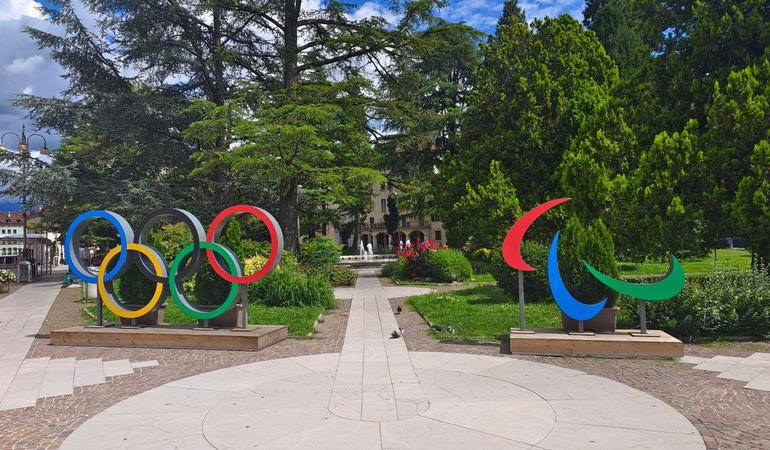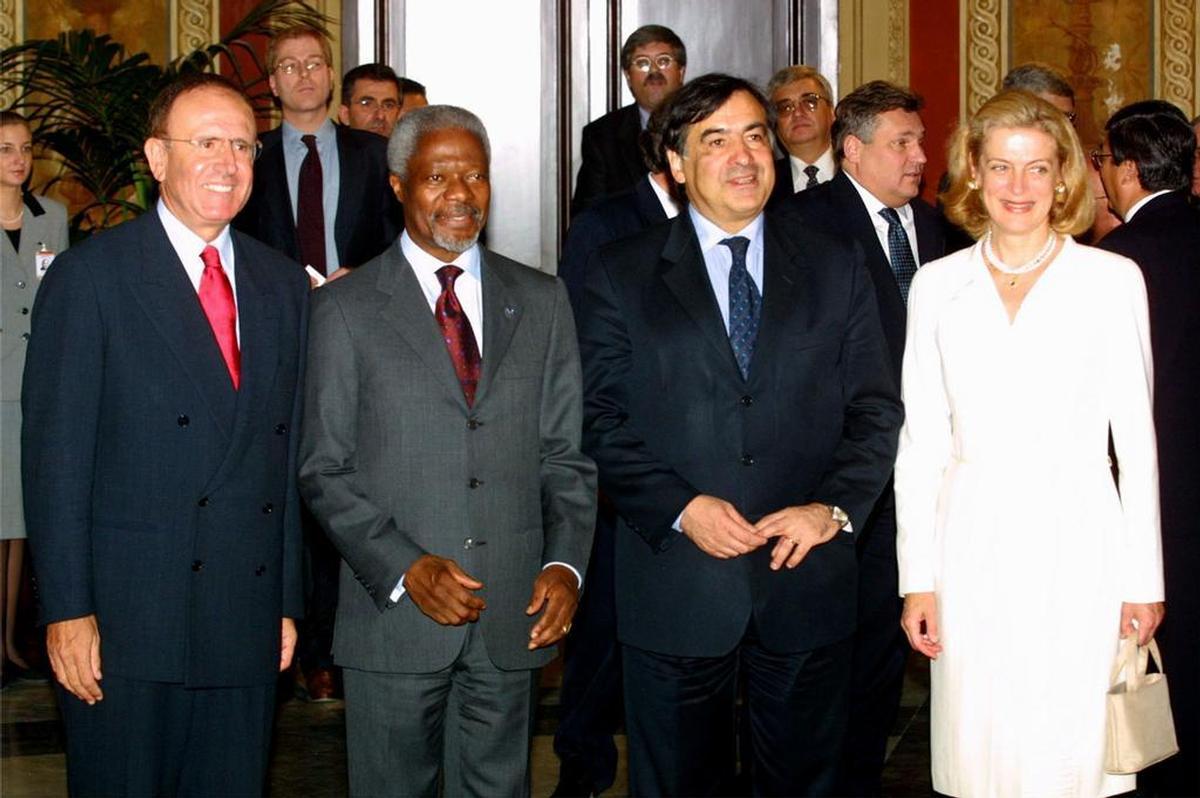
Milano-Cortina. Ecco come verranno spesi i 450 milioni di euro delle paralimpiadi



9 febbraio 2023
On 12 March 1909, Giuseppe ‘Joe’ Petrosino, a policeman born in the province of Salerno who emigrated to New York City with his family as a young boy, travelled to Palermo to investigate relations between the ‘Black Hand’ in the U.S. and the Sicilian Mafia. While walking in Piazza Marina, not far from the Hotel de France where he was staying, Lieutenant Petrosino, well known and even feared in the United States—especially in suburbs inhabited by Italian emigrants—was killed by four bullets. The murder caused a sensation in Italy, but even more across the Atlantic, as it showed that already in the early 20th century organized crime had far-reaching international ramifications.
A century later, in December 2000, Palermo was chosen to host a major UN conference where the Convention Against Transnational Organized Crime (UNTOC) was introduced. The Convention, adopted by the General Assembly on November 15, 2000, was the first such document to offer a shared definition which made it possible for different countries to acknowledge organized crime and prosecute it in the same way. That definition was arrived at after years of negotiations, and was later criticized as inadequate. As a matter of fact it does show some ambiguity, for example in the part dealing with associations considered illegal in their countries of origin but that do not actually engage in any of the illegal activities listed in the Convention.
UNTOC is comprised of 41 articles and its stated goal is to promote cooperation among its signatories by way of shared mechanisms of prevention, investigation and repression. The signatories commit themselves to adopt the countermeasures contained therein and integrate them in their legislation. Four new domestic criminal offences are established: participation in an organized criminal group; money laundering; bribery; obstruction of justice.
Palermo was not chosen by chance
Article 5 criminalizes participation in an organized criminal group and mandates prosecution of whoever agrees with one or more other persons to commit serious crimes aimed at obtaining financial or other material benefits, as well as whoever takes an active part in the activities of an organized criminal group.
Article 6 is entitled, ‘Criminalization of the Laundering of Proceeds of Crime’ and concerns the conversion or transfer of property that is the proceeds of crime for the purpose of concealing or disguising its illicit origin or of helping any person who is involved in the commission of the crime to evade the legal consequences.
Article 8, ‘Criminalization of Corruption,’ is directed against whoever directly or indirectly promises, offers or gives a public official an undue advantage to act, or refrain from acting, in the exercise of his/her official duties.
Finally, Article 23, ‘Criminalization of Obstruction of Justice,’ establishes as criminal offences the use of physical force, threats or intimidation or the offering of undue advantages to induce perjury or to interfere in the giving of testimony or the production of evidence in legal proceedings.
The UN had already put the issue of transnational crime on its agenda in the 1970s, but the discussion was then limited to a few sporadic meetings organized around the world. The turning point came in 1988, when the Convention against Trafficking in Narcotic Drugs and Psychotropic Substances was adopted in Vienna, and above all, when the huge economic interests behind the expansion of drug trafficking were recognized at last. Such interests made it possible for organized crime groups to penetrate institutions and contaminate the economy, the world of business, and civil society itself.
After the signing of the Vienna Convention, in 1994 the foundations were laid for a legal tool to counter the onslaught of international crime when Naples hosted a major conference. There, the 140 participating countries signed a document declaring their intention to move in that direction. Two years later, the Polish government drew up an official draft and in 1998, in New York, the UN General Assembly decided to establish an intergovernmental committee comprised of representatives of member countries with the task of drafting a treaty. Its final text was approved in October 2000 and formally adopted on 15 November, one month before the Palermo conference.
The Convention entered into force on Sept. 29, 2003, and its important new features were three protocols devoted respectively to the trafficking in persons (especially women and children), the smuggling of migrants, and the illegal manufacturing and trafficking in firearms. The first two protocols underwent the ratification process in Palermo, while the third was adopted by the UN General Assembly on 31 May 2001.
This protocol came into force on Dec. 25, but Italy did not ratify it until August 2006 despite being among the first signatories. The document committed states to cooperating to prevent and combat trafficking in persons and protect and assist victims. Trafficking was to be understood as ‘the recruitment, transportation, transfer, harboring or receipt of persons, by means of the threat or use of force or other forms of coercion, of abduction, of fraud, of deception, of the abuse of power or of a position of vulnerability or of the giving or receiving of payments or benefits to achieve the consent of a person having authority over another for the purpose of exploitation.’ In particular, exploitation included prostitution of others or other forms of sexual exploitation, forced labor or services, slavery or practices similar to slavery, servitude or the removal of organs. Particular attention was paid to minors and a number of protections were offered, including temporary or permanent residence in countries of transit or destination.
The many interests surrounding drugs from Mexico
The smuggling of migrants is ‘the procuring, for the purpose of gaining, directly or indirectly, a financial or material advantage, the illegal entry of a person into a state party of which the person is not a national or permanent resident’
This protocol came into force on Jan. 28, 2004. It contained a number of protections for victims and socio-economic measures to address the causes of migration, with the purpose of curbing the power and influence of organized criminal groups. Once again a definition was provided: the smuggling of migrants was defined as ‘the procuring, for the purpose of gaining, directly or indirectly, a financial or material advantage, the illegal entry of a person into a state party of which the person is not a national or permanent resident.’ In addition to the trafficking, the manufacturing of fraudulent travel or identity documents was also criminalized. The protocol condemned the endangering the life and safety of migrants and any inhuman or degrading treatment.
Regarding trafficking by sea, any state party suspecting or ascertaining the existence of a vessel involved in illicit activity had the option of demanding the intervention of other states, as well as of the flag state. The latter was also permitted to authorize the requesting state to stop and inspect the vessel and, if there was evidence of the vessel’s involvement with migrant smuggling, take action against the persons and cargo on board. States must, however, ensure the safety and humane treatment of travelers.
Furthermore, in order to maximize cooperation, the signatories of the protocol, in particular countries bordering or along migrant smuggling routes, were encouraged to exchange ‘information concerning points of embarkation and destination, as well as routes, transporters and means of transport, known to be used or suspected of being used by organized criminal groups,’ as well as ‘methods of concealment and transportation of persons.’
Illicit trafficking is ‘the import, export, acquisition, sale, delivery, transport or transfer of firearms, their parts, components and ammunition from or through the territory of one state party to the territory of another state party'
This protocol entered into force on July 3, 2005, and proved the most controversial of all. Here too, useful definitions were provided. A firearm is ‘any portable barreled weapon, except antique firearms or reproductions thereof, that expels, is designed to expel or may be converted to expel a shot, bullet or projectile by the action of a propelling charge.’ Illicit trafficking is ‘the import, export, acquisition, sale, delivery, transport or transfer of firearms, their parts, components and ammunition from or through the territory of one state party to the territory of another state party, if either state concerned does not authorize it in accordance with the provisions of this Protocol or if the firearms are not marked.’
Emphasis was placed on the marking of weapons, deemed indispensable for their tracing. At the time of manufacturing each weapon must be unmistakably marked with the name of the manufacturer, the country or place of manufacture, and the serial number (or, alternatively, simple geometric symbols and a numerical and/or alphanumerical code). Equally important was the deactivation of weapons: their essential parts must be rendered ‘permanently inoperable and incapable of removal, replacement or modification in a manner that would permit the firearm to be reactivated in any way.’ Where appropriate, a competent authority must then verify that deactivation had taken place. Finally, the signatory states must establish an effective licensing or authorization system for exporting and importing firearms and design measures on international transit. This protocol has never been signed by the US or implemented by the UK.
Illegal weapons trafficking is un understimated phenomenon
The formal importance of the Palermo Convention lies in its being an attempt at changing the perspective. For the first time the criminal aspect (hence the repressive and judicial measures) was viewed as just one component of a more complex strategy including cooperation and prevention policies.
The document dealt with a number of additional points:?
An interesting passage dealt with society’s most marginal social groups, considered by insiders to be those most susceptible to the pull of organized crime. Hence the exhortation to enhance cooperation, not only between states, but also among associations, organizations and scientific institutions of the signatory countries.
In order to ensure the Convention’s continuity, the Conference of the Parties is held every two years at the headquarters of the United Nations Office on Drugs and Crime (UNODC), with the participation of international diplomatic delegations, representatives of civil society, associations and NGOs. Libera has been among its participants since 2014, when ECOSOC, the UN Economic and Social Council, granted it the consultant status, thus allowing our association to access ECOSOC documentation and meetings, as well as to contribute to its decision-making processes.
La tua donazione ci servirà a mantenere il sito accessibile a tutti
La tua donazione ci servirà a mantenere il sito accessibile a tutti